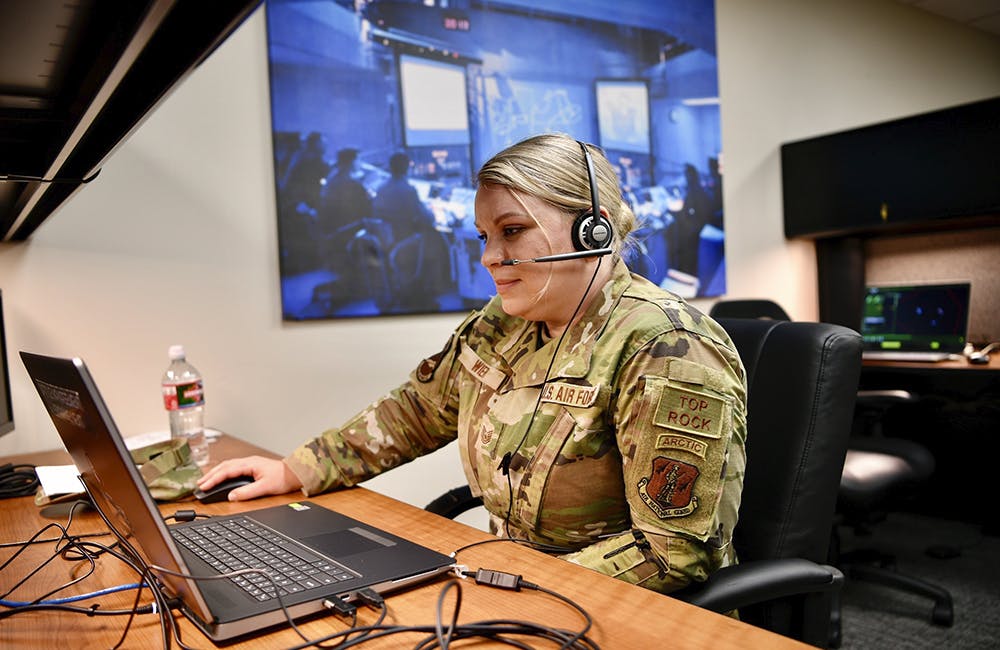Mission and Culture Will Drive AI Excellence at DOD, Top AI Leaders Say
New DOD Chief Digital and AI Officer Craig Martell said the DOD mission lured him away from Lyft and now wants to develop a culture that appeals to new AI talent as well.

The Defense Department cited culture as a major hurdle to implementing the department’s AI strategy and pulling ahead of China and Russia in the AI race, top defense leaders said at the DOD Digital & AI Symposium Tuesday.
“The government has trouble getting people into its offices because of the way it operates,” said Eric Schmidt, a commissioner for the National Security Commission on Artificial Intelligence, during a symposium panel Tuesday. “You identify a young person who takes 18 months to get their security clearance and they need their clearance to do their job. The bizarre baroque way in which personnel are handled … we worked hard on this without much success. Not even the president could fix the HR system in DOD.”
Tangential to the culture problem is competing with Silicon Valley for top AI talent. Schmidt and Craig Martell, DOD’s new chief digital and AI officer, both believe the DOD mission will draw talent, not salaries.
Enticing young college graduates to work in AI at DOD can also jumpstart their careers ahead of peers that go directly to Silicon Valley, Schmidt added.
“If you think about the DOD, it’s the hardest enterprise problem and one of the hardest data problems in the world,” he said. “You do that for a couple years and now you’re dealing with a more flexible working environment, but you’re trained on Big Data and Big Data problems.”
Martell said the mission is what originally drew him to the CDAO position.
“I’m doing it because of the mission,” he told Schmidt at the symposium. “It’s extremely important we get this right, and there aren’t a lot of folks with the intersection of AI and government background. When the deputy secretary of defense calls you up and asks you to take this job, you have to think really hard about why you wouldn’t take this job.”
William Streilein, CTO within the office of the DOD CDAO and former CTO of DOD’s Joint Artificial Intelligence Center (JAIC), said the United States’ AI advantage is “eroding,” in part due to a lacking AI culture and talent pool.
“I think the No. 1 problem is culture,” he said during a symposium panel Tuesday. “I think the other things will follow if we get the culture right. The main obstacle is a culture accepting of change while maintaining our mission goals.”
Margarita Konaev, deputy director of analysis at the Center for Security and Emerging Technology, echoed Streilein’s concerns and said DOD’s sprawling, bureaucratic structure can impede a robust AI culture from being realized.
“There are serious challenges that remain … [such as] a risk-averse culture, the preference to continue with the path we’re already in and the lack of incentives to promote AI and analytics and data and foster a more experimental culture,” she said during a symposium panel Tuesday. “The contrast is surprising in a sense because you have a military at the strategic and tactical level that is ready to learn and experiment and learned to learn from previous engagements and conflicts. At the same time at the organizational level, we have a lot more static structure that tends to favor the past as opposed to the future of war.”
As the DOD CDAO ramps up operations after absorbing the JAIC, the Defense Digital Service and DOD’s ADVANA teams, developing a healthy culture may be Martell’s biggest challenge, said Martijn Rasser, senior fellow and director of the Technology and National Security Program at the Center for New American Security.
“I think that’s the biggest challenge for the CDAO, but also the biggest opportunity,” he said during a symposium panel Tuesday. “We don’t know exactly what the right culture is. We know what’s currently in place is not what it needs to be. Figuring out what that culture should look like will be a fascinating exercise. I think the department has the human capital it needs to use AI well, so I don’t see that as much as a problem, there’s still changes that need to be made in terms of attracting and retaining talent, but there are a lot of really talented people already in place that are probably underutilized.”
This is a carousel with manually rotating slides. Use Next and Previous buttons to navigate or jump to a slide with the slide dots
-

NIST Launches ARIA to Redefine How AI Is Evaluated
NIST's ARIA aims to measure real‑world AI behavior, moving beyond accuracy scores to capture risks revealed through model testing, red‑teaming and field trials.
3m read -

Flipping the Script on AI Adoption at Space Force
The newest military service is moving away from off-the-shelf solutions to build a culture of internal innovation and mission-specific tools.
10m watch -

OPM Extends Tech Force Deadline as Program Tests New Federal Hiring Model
High demand prompted OPM to extend Tech Force applications to Feb. 2 as the agency pilots centralized, skills-based hiring.
5m read -

FDA Outlines AI Principles for Drug Development
New FDA guidance outlines 10 principles for using AI in drug research, development and manufacturing, developed with European regulators.
3m read








